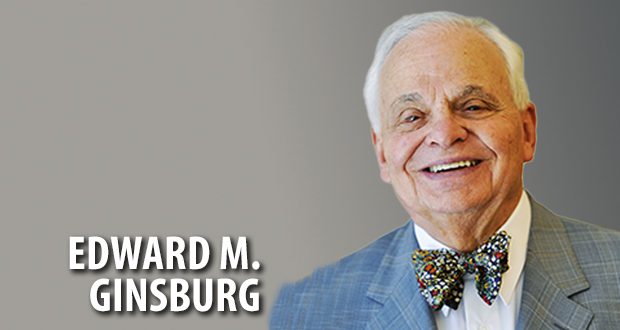
October 13, 2022
‘Senior Partners’ milestone something to celebrate
BY Mass. Lawyers Weekly
It’s safe to say Probate & Family Court Judge Edward M. Ginsburg wasn’t the first to feel that he still had more to give the legal community when he hit the state’s mandatory retirement age of 70. But what’s notable is how little time he wasted getting down to business — and how successful he’s been in rallying others to his cause.
Ginsburg’s refusal to sit idle makes the math easy. As he’s now turning 90, that means his brainchild, Senior Partners for Justice, is about to turn 20 — on Oct. 13, to be exact.
Run under the umbrella of the Volunteer Lawyers Project, SPJ connects retired lawyers and judges and other senior attorneys with pro bono opportunities, mainly in the Probate & Family Court.
Judge David G. Sacks, who sat on the Hampden Probate Court from 1986 until his mandatory retirement in 2020, recalls hearing Ginsburg say early on that he was hoping Senior Partners would one day boast 100 volunteers.
The number is now almost at 1,000. Along the way, SPJ has expanded from what was initially an eastern Massachusetts effort to one that today also has a branch in the western part of the state.
Barbara Siegel, SPJ’s program director, says the magnitude of Ginsburg’s achievement should not be underestimated, given that nationally it has long been the case that family law cases have been a tough sell to proven pro bono lawyers.
But among Ginsburg’s talents is “the inability of anybody to say ‘no’ to him,” Sacks says.
Siegel agrees, likening Ginsburg to the pied piper. But in Ginsburg’s case, his “woodwind” is monthly lunches featuring speakers on legal topics of interest.
Until the pandemic struck, there would be one lunch in Boston and one in Springfield. Ginsburg was there without fail to ensure the clipboard made its way around the room so that attendees could sign up to serve as conciliators, take on pro bono divorce or paternity cases, or otherwise be of service. The lunches have since been combined into one monthly Zoom call.
While SPJ’s focus has been family law cases, it has also helped foster the growth of limited assistance representation in the legal system more broadly, Siegel notes.
“Senior Partners was really key in getting LAR adopted across the Probate & Family Court, and then across all of the trial courts,” Siegel says. “[SPJ’s] pro bono lawyers proved the concept for other members of the bar.”
There are other examples of the courts turning to Ginsburg when they needed help with something important.
One example is from 2009, when the guardianship law changed to require courts to review annually care plans by guardians. At least initially, the courts didn’t have the staff to meet that mandate, “so we stepped into the breach,” Siegel says.
Similarly, SPJ launched a project to fill a need identified by then-Probate & Family Court Chief Judge Paula M. Carey for temporary guardians ad litem for adults who didn’t have anyone in their lives to help them manage their affairs. Ginsburg mobilized groups of lawyers to fill the void.
SPJ continues to evolve. Just last year, the organization joined forces with the Hampden County Bar Association and Community Legal Aid to launch a conciliation program, to which the presiding judge can refer Probate & Family Court matters that he or she believes would be better resolved with the help of a trained neutral.
SPJ also established a mentoring program for retired judges and lawyers who may not want to take on full-blown cases but are more than happy to guide newer attorneys through their own volunteer cases.
First and foremost, SPJ has been a boon to low-income litigants who might otherwise have come into court with little idea how to advocate for their rights, leading to worse outcomes, Sacks says.
SPJ has also been able to help a court swamped by its caseload move cases to settlement, or at least narrow the issues requiring the court’s attention.
Plus, Ginsburg has opened an avenue for senior lawyers to reap a “major personal reward” from the satisfaction of providing that much-needed help.
To ensure that the volunteer lawyers know they are appreciated, Ginsburg continues to call each one after every case they handle.
“I can’t even imagine how many thank-you calls he’s made,” Siegel says.
Ginsburg’s vision in establishing Senior Partners for Justice, and his ongoing efforts to ensure it remains a vital, positive force have made the local legal community a better place, and for that he deserves our gratitude.
And finally, happy birthday to Judge Ginsburg!

















































